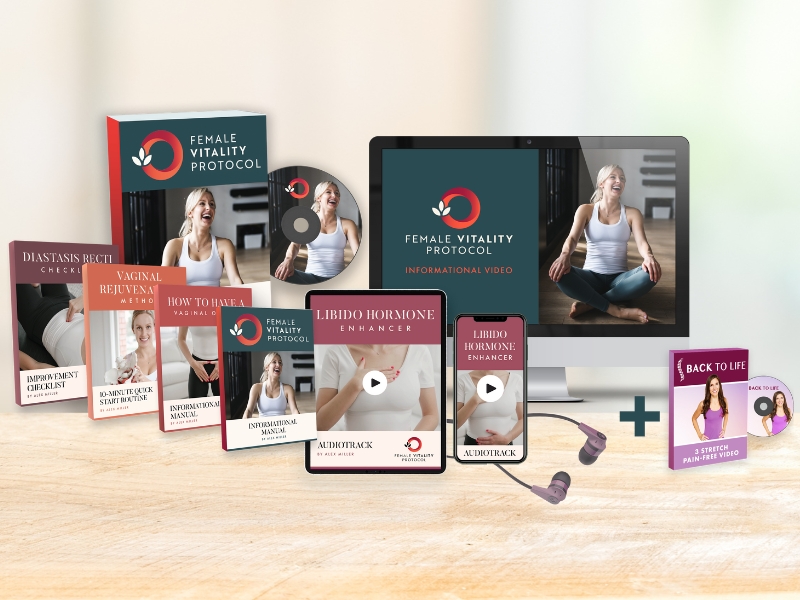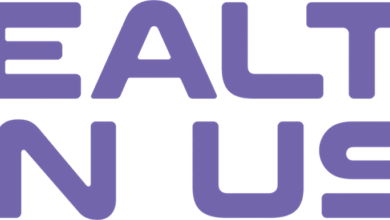Female Vitality Protocol: Restore Energy, Hormone Balance & Wellness
Female Vitality Protocol: Restore Energy, Hormone Balance & Wellness

In today’s demanding world, women often find themselves juggling multiple roles—career, family, social life—while managing the natural changes that come with aging. Many women experience declines in energy, hormonal imbalances, mood swings, and loss of confidence. These issues can profoundly impact quality of life.
The Female Vitality Protocol is a holistic wellness system designed to support women through these challenges by restoring energy, balancing hormones, and enhancing overall health. This article will explore what the Female Vitality Protocol is, its core components, benefits, and how it empowers women to reclaim their vitality naturally and sustainably.

Understanding Female Vitality and Why It Declines
Vitality refers to a state of physical and mental well-being, marked by high energy, emotional resilience, and healthy body function. For women, vitality is closely tied to hormonal health, nutrition, lifestyle, and mental wellness.
However, several factors can contribute to a decline in female vitality:
-
Hormonal Fluctuations: Changes in estrogen, progesterone, and other hormones during menstruation, pregnancy, postpartum, perimenopause, and menopause.
-
Chronic Stress: Elevated cortisol from long-term stress disrupts hormone balance, reduces energy, and impacts mood.
-
Nutritional Deficiencies: Poor diet or malabsorption can lead to low vitamin and mineral levels essential for hormonal health and energy production.
-
Sedentary Lifestyle: Insufficient physical activity affects muscle tone, circulation, and metabolic rate.
-
Sleep Disturbances: Poor sleep quality hinders recovery, mental focus, and hormonal regulation.
When these factors persist, women may feel chronically tired, anxious, emotionally unbalanced, and disconnected from their sense of self.
What is the Female Vitality Protocol?
The Female Vitality Protocol is a structured, natural program designed to tackle the root causes of female vitality loss. It focuses on improving hormone balance, increasing energy, reducing stress, and enhancing mental and physical health.
This protocol integrates:
-
Targeted exercises, particularly pelvic floor and core strengthening
-
Nutritional guidance emphasizing hormone-supportive foods
-
Stress reduction and mindfulness techniques
-
Sleep optimization strategies
-
Lifestyle adjustments to foster sustainable wellness
It is adaptable for women at different life stages, from early adulthood to menopause and beyond.
The Core Components of the Female Vitality Protocol
1. Pelvic Floor and Core Strengthening Exercises
A strong pelvic floor and core provide the foundation for female health. These muscles support pelvic organs, regulate bladder and bowel control, and play a critical role in sexual function and hormonal health.
The protocol includes exercises such as:
-
Kegel Exercises: Contracting and relaxing pelvic muscles to improve strength and circulation.
-
Bridges: Activating glute and lower back muscles to enhance posture.
-
Pilates-based Movements: Focus on deep core engagement to improve muscle tone safely.
These exercises help improve blood flow, stimulate hormone balance, reduce incontinence risk, and boost body confidence.
2. Hormone-Supportive Nutrition
Nutrition profoundly influences hormone production and energy metabolism. The Female Vitality Protocol promotes a diet rich in:
-
Whole, unprocessed foods: Fresh vegetables, fruits, lean proteins, healthy fats
-
Phytoestrogen-rich foods: Flaxseeds, soy, chickpeas that gently support estrogen balance
-
Omega-3 Fatty Acids: Found in fatty fish, walnuts, and chia seeds, which reduce inflammation and support brain health
-
Complex carbohydrates: Whole grains and legumes for sustained energy
It also recommends avoiding excess sugar, refined carbs, caffeine, and processed foods that can exacerbate hormonal imbalances.
3. Stress Management and Mindfulness
Chronic stress elevates cortisol levels, negatively impacting reproductive hormones, mood, and energy.
The protocol teaches women how to incorporate:
-
Mindfulness meditation: Focusing attention on the present moment to reduce anxiety
-
Breathing exercises: Deep diaphragmatic breathing to activate the parasympathetic nervous system
-
Gentle yoga or tai chi: Movements that promote relaxation and body awareness
By reducing stress, women can better regulate hormones and improve overall well-being.
4. Sleep Hygiene and Restoration
Sleep is critical for hormonal regulation, cognitive function, and energy restoration. The protocol includes practical steps like:
-
Establishing consistent sleep-wake schedules
-
Creating a calming bedtime routine
-
Limiting screen exposure before sleep
-
Making the bedroom dark, cool, and quiet
Better sleep supports cortisol balance and promotes emotional resilience.
5. Lifestyle and Self-Care Practices
Sustaining vitality requires a holistic approach that includes:
-
Regular physical activity adjusted to individual needs and fitness levels
-
Setting healthy boundaries to prevent burnout
-
Prioritizing hobbies and social connections for emotional support
-
Staying hydrated and avoiding toxins such as excessive alcohol and smoking
These habits nurture a vibrant, balanced lifestyle.
Benefits of the Female Vitality Protocol
Women who follow the protocol often report significant improvements in:
-
Energy Levels: More stamina and reduced fatigue throughout the day
-
Hormonal Balance: Relief from PMS, menopause symptoms, and mood swings
-
Sexual Health: Increased libido and enhanced sexual confidence
-
Mental Clarity: Better focus, memory, and emotional stability
-
Physical Strength: Improved posture, pelvic health, and muscle tone
-
Stress Resilience: Greater ability to cope with life’s pressures calmly
Ultimately, the protocol empowers women to reclaim control over their health naturally.

Who Should Follow the Female Vitality Protocol?
The protocol is beneficial for:
-
Women experiencing perimenopause or menopause symptoms
-
Postpartum mothers seeking recovery support
-
Women dealing with chronic fatigue or hormonal imbalance
-
Anyone wanting to boost general wellness and vitality
It is flexible and can be adapted to different ages, fitness levels, and health statuses.
How to Begin the Female Vitality Protocol
-
Evaluate Your Current Health: Reflect on energy, mood, diet, and lifestyle.
-
Set Practical Goals: Start with small, manageable steps.
-
Learn the Exercises: Begin pelvic floor and core strengthening routines.
-
Adjust Your Diet: Incorporate nutrient-rich, hormone-supportive foods.
-
Practice Stress Reduction: Commit to daily mindfulness or breathing.
-
Improve Sleep: Follow sleep hygiene guidelines.
-
Adopt Self-Care Habits: Prioritize rest, hobbies, and social time.
-
Track Progress: Note changes in symptoms and adjust routines accordingly.
Consistency over weeks and months leads to meaningful transformation.
Real-Life Experiences
-
Anna, 40: “This protocol helped me regain energy and balance during early menopause. The pelvic exercises and diet changes made a huge difference.”
-
Sophia, 30: “After my second baby, I felt exhausted and disconnected. The Female Vitality Protocol gave me tools to heal and feel like myself again.”
-
Monica, 50: “I sleep better, feel less anxious, and my mood is stable. The lifestyle changes really helped me.”
Tips for Maximizing Results
-
Stay hydrated by drinking plenty of water daily.
-
Avoid excessive caffeine and alcohol consumption.
-
Incorporate gentle movement throughout the day.
-
Practice gratitude and positive self-talk.
-
Consult your healthcare provider before making major changes.
Frequently Asked Questions (FAQs)
1. How soon can I expect results from the Female Vitality Protocol?
Results vary but many women notice improvements in energy and mood within 2-4 weeks, with more lasting benefits over 8-12 weeks.
2. Is the protocol safe for women with health conditions?
Generally yes, but it’s best to consult your doctor before starting any new regimen, especially if you have medical conditions.
3. Do I need special equipment for the exercises?
No, the exercises primarily use body weight and can be done at home without equipment.
4. Can this protocol help with menopause symptoms?
Yes, it is designed to support hormonal balance and ease symptoms like hot flashes, night sweats, and mood swings.
5. Can younger women benefit from this protocol?
Absolutely. Women of all ages can benefit, including those dealing with postpartum recovery or chronic fatigue.
Conclusion
The Female Vitality Protocol offers a comprehensive, natural roadmap for women to regain their energy, balance their hormones, and boost their confidence. By integrating targeted exercise, nutrition, stress management, sleep optimization, and lifestyle changes, women can achieve lasting wellness and vitality.
If you’re ready to reclaim your health and live vibrantly, the Female Vitality Protocol can be your guiding light. Start today, and take the first step toward a more energized, balanced, and confident you.








